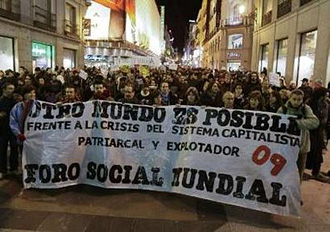
|  |  |  Americas & Beyond | January 2009 Americas & Beyond | January 2009  
World Social Forum: Analysts Question Its Limits
 Diego Cevallos - Inter Press Service Diego Cevallos - Inter Press Service
go to original


| | Participants at the World Social Fourm hold a banner during a rally in central Madrid January 24, 2009. The banner reads, "Another world is possible, opposite the capitalist system crisis, World Social Forum ". (Reuters/Juan Medina) |  |
Prominent Mexico-based German political analyst Heinz Dieterich said he believes the World Social Forum, which is meeting this week in the northern Brazilian Amazon jungle city of Belem, falls short in the innovation department and fails to generate real change.

In an interview with IPS, Dieterich said the current edition of the WSF may draw more attention than most of the previous gatherings, because it coincides with the present "crisis of capitalism." But, he added, even if it manages to reach any kind of consensus, it will be unlikely to call for changes that go beyond the "current social democratic strategies."

According to the analyst, who has lived in Mexico for decades, such strategies are aimed at keeping "the system alive, with slightly greater intervention by the state" – a path he says he does not agree with, because in his view capitalism is not suffering just another crisis, but the beginning of the end.

Dieterich, who recently retired as a sociology professor from the Autonomous Metropolitan University in Mexico City, wrote "21st Century Socialism" about a current of social economic thinking that has been espoused by left-leaning presidents like Venezuela’s Hugo Chávez and Ecuador’s Rafael Correa.

The main WSF gathering is taking place in Belem Jan. 27-Feb. 1. But parallel meetings will be held in different cities around the world, including Mexico City and the northern Mexican city of Chihuahua on the U.S. border.

"The simple fact of holding the forum is important because it allows organisations, universities, activists and society to come together and forge connections. But there is a long stretch between that and actually bringing about changes," Erika Terrazas, an anthropologist at the National School of Anthropology and History in Chihuahua, commented to IPS.

The broad range of activities at the Jan. 30-Feb. 1 meetings in Mexico will include panels on global and local problems, conferences, and cultural and artistic events.

"It is hard to actually manage to change things, like the violent crime that we are experiencing here in Chihuahua, for example," said Terrazas, one of the organisers of the WSF meeting in her city. "But just the fact that we are coming together is a step forward, and that is why we are holding the forum."

Nearly 2,500 people were murdered last year in drug trafficking-related killings in Chihuahua.

The WSF initially emerged as a kind of counterpoint to the World Economic Forum, which brings the world’s economic and political movers and shakers together every year in late January in the Swiss ski resort city of Davos.

Portuguese sociologist Boaventura de Sousa Santos, a member of the WSF International Committee, said the participants in the Belem meeting should take "a clear and visible stance on the global economic crisis" and how to confront it.

In Dieterich’s view, the WSF, which has brought together social movements, non-governmental organisations and other civil society groups every year since 2001, usually in the southern Brazilian city of Porto Alegre, has failed to offer innovative proposals in the past and will not do so in the future.

He said the problems plaguing the global economy today show that "industrial capitalism" is nearing its end, after "250 years of life," and that it is time "to find a new form of civilisation.

"But the momentum for change will not come out of the WSF, which was and is dominated by social democratic and progressive Christian thinking," he said.

"The WSF is more in line with accepting the ‘New Deal’ offered by the new U.S. President Barack Obama, which translates into a continuation of capitalism, but with slightly greater state intervention and a few other minor changes," said Dieterich.

The analyst, who in the past was a staunch supporter of Venezuela’s controversial President Chávez, has gradually taken a more critical position towards his government in the past few months.

Prior to the 2005 WSF held in Brazil, Dieterich told IPS that the gatherings did not generate compelling political statements or commitments, and that they were more like "summer school."

And although he said this week’s meeting in Belem might be different, with the global crisis as its backdrop, which could "give it a boost," he clarified that he expects it to produce no major changes. |

 |
|  |



